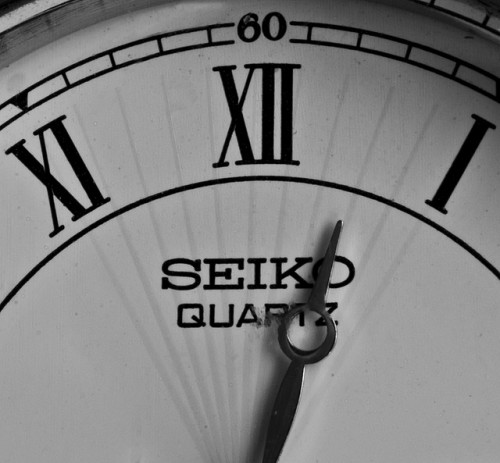
Like many people, I often come up short on time. There’s never enough time, it seems, to get everything done that I want to get done. While finding the time to get my finances in order isn’t a problem for me, I know that it is for many. I hear from people all the time that they don’t have time to create and manage a budget, clip coupons, get quotes or negotiate service prices, or create a will or other legal documents. By the time they put in an eight our work day, deal with all the chores around the house and take care of the kids, they claim there’s no time for financial management, even if it is crucial to a good life.
The thing is, many of us have more time than we think we have, if we’re really honest with ourselves about what constitutes wasted time and what’s important. Not long ago I was having trouble finding time to devote to my writing projects, beyond the work I do for Saving Advice. Among other things, I want to finally finish and submit the novel I’ve been slowly working on. But it seemed that there was never enough time to get to it. I finally had to determine that the novel was more important to me than some other things. Once I made that decision, time miraculously appeared.
I decided that my project was more important to me than TV, mindless Internet surfing, sleeping in on Saturdays, and even some household chores. It required some conscious thought on my part. Whenever I sit down to watch TV, I ask myself which is more important: The show, or the book. The book almost always wins. Whenever I find myself mindlessly clicking links on websites, I ask myself which is more important: The newest stupid viral video, or the book. Again, the book wins. Can the dusting wait one more day while I finish a chapter? Of course it can. Suddenly all kinds of time became available once I stopped wasting so much of it. I never thought of myself as a big time-waster, but it was eye opening how much time I was spending on things that weren’t important to me.
If your finances are important to you (and they should be since almost everything else in your life hinges on the health of your financial life), you need to ask yourself which is more important: Your finances, or whatever other thing you’re about to do. If you’re serious about getting your finances straight, the answer should be your finances. (The good news is that once you have your finances under control they require less time to deal with, leaving you with more free time to do other things.)
I use the following criteria to judge whether or not what I’m doing constitutes wasted time. Wasted time is time spent doing something that isn’t important to me or fails to move me forward. I know that my time on Earth is limited. While sometimes it seems like time is limitless, the truth is that it isn’t. I’ve started asking myself if whatever action I’m about to take is important or something that will get me closer to my goals. If the answer is no and I have a choice, I don’t do the activity. Your criteria may be different, but find out what represents wasted time to you and then work to eliminate it.
Paying attention only to what is important requires conscious thought on your part, at least until you get the hang of it. You have to constantly evaluate everything you do to see if it represents wasted time and attention. Once you start doing this, though, it’s amazing how much time you can recapture. I also feel better now that I know I’m not wasting my time. I thought I’d be more tired from keeping so active, but I’ve found the opposite to be true. The more I do each day that is important to me, the better I feel. I feel like I’m accomplishing more and I’m energized because I know I’m doing things that help me reach my goals.
(Photo courtesy of M$$MO)

Jennifer Derrick is a freelance writer, novelist and children’s book author. When she’s not writing Jennifer enjoys running marathons, playing tennis, boardgames and reading pretty much everything she can get her hands on. You can learn more about Jennifer at: https://jenniferderrick.com/.
Comments